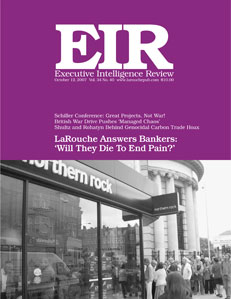‘They Would Die To End Their Pain!’: Pennsylvania Banker Howls
by Lyndon H. LaRouche, Jr.
Lyndon H. LaRouche, Jr. responds to a banker’s hysterical reaction to the support for LaRouche’s “Homeowner and Bank Protection Act of 2007.” Instead of a fanatical adherence to the axiomatic rules of today’s economic practice, the survival of the economy depends upon both a radical overturn of the currently accepted rules of economic behavior, which are the cause of the problem, and a return to the principles of constitutional law employed by President Franklin Roosevelt.
Reisteter’s Letter
by Daniel J. Reisteter
LYM To Congress: Erect Firewall, or Be Fired!
by Matthew Ogden
Matthew Ogden, of the LaRouche Youth Movement, reports on the progress toward implementing LaRouche’s Homeowner and Bank Protection Act.
‘What Banking Crisis?’: Congress Is Faking Help to Homeowners
by Richard Freeman and Paul Gallagher
The measures that Congressmen are proposing to deal with the foreclosures crisis are only going to make matters worse.
At Ground Zero: Loudoun County Real Estate Bubble Implodes on Residents, Local Government
by L. Wolfe and John Hoefle
International
Britain’s ‘Managed Chaos’ Drives the World Toward War
by Jeffrey Steinberg
The British gameplan is to stick the United States with the legacy of crushing failure in Iraq and Afghanistan, and the hatred of much of the Arab and Islamic world.
Urgent Measures for Defending the General Welfare in Germany
by Helga Zepp-LaRouche
Helga Zepp-LaRouche is chairwoman of the Civil Rights Solidarity Movement (BüSo) party in Germany.
What Indian Voters Must Demand Now
by Ramtanu Maitra
Ramtanu Maitra outlines three priorities for whatever new national government takes power.
Southern Africans Rally Against British Assault on Zimbabwe
by Lawrence K. Freeman
Amelia Robinson Takes Denmark by Storm
by Feride Istogu Gillesberg
International Intelligence
Economics
Behind ‘Carbon Trade’ Hoax: George Shultz, Felix Rohatyn
by Marcia Merry Baker
The pretext for the cap-and-trade scheme is global warming, and the political nexus behind it involves the same circles who are pushing for perpetual war in the Persian Gulf region and elsewhere.
Ethanol Bubble Pops; Biofoolery in Congress
by Marcia Merry Baker and Robert Baker
Germany Is Getting ‘Re-Magleved,’ Finally
by Rainer Apel
Business Briefs
Conference Report
Schiller Institute: Construct the Land-Bridge, Prevent a New Dark Age
Part 3 of the proceedings of the Schiller Institute’s Sept. 15-16 conference in Kiedrich, Germany, on “The Eurasian Land-Bridge Is Becoming a Reality!”
The U.S. Neo-Cons and Iran’s Nuclear Energy
by Pirouz Mojtahed-Zadeh, Ph.D.
Speech by Dr. Pirouz Mojtahed-Zadeh, professor of political geography and geopolitics at Tarbiat Modarres University in Tehran.
Lyndon LaRouche and the Muslim World
by Ahmed Kedidi
By Dr. Ahmed Kedidi, professor at Doha University in Qatar, and president of the European Academy of International Relations, Paris.
CargoCap: A New Way To Transport Freight
by Holger Beckmann
By Dr. Holger Beckmann of the Ruhr University, Bochum, Germany.
Great Projects Are What the World Needs
by Pierre Chiquet
By Pierre Chiquet, the founder of the space centers of Bretigny and Toulouse, France, and the rocketlaunching platform of Kourou.
Civil Rights for All People of the Planet
by Amelia Boynton Robinson
Amelia Boynton Robinson is well-known as the heroine of the civil rights movement.
Cultural Paradigm of the New Millennium
by Jacques Cheminade
Jacques Cheminade is leader of the LaRouche movement in France.
Thomas Sankara on Africa’s Debt Burden
by Thomas Sankara
An excerpt of a speech in 1987 by Burkina Faso President Thomas Sankara.
Science
On Vernadsky’s Space: More on the Calculus
by Lyndon H. LaRouche, Jr.
Lyndon LaRouche resumes his discussion with a LaRouche Youth Movement team researching Carl Gauss’s method. These thoughts were provoked by Vladimir I. Vernadsky’s work on spacetime, and draw the team’s attention to a still deeper epistemological implication of the same subject-matter. How was the appearance of spherical boundedness generated for the mind of man? Does that appearance not imply that a quality of “sphericalness” bounds the universe? If so, does something else, of a still higher epistemological authority, bound that apparently spherical quality of boundedness?
Editorial
Defeat Today’s Fascist Threat



